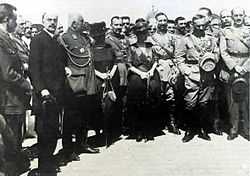Aristeidis Stergiadis

Aristeidis Stergiadis (Greek: Αριστείδης Στεργιάδης) (1861, Herakleion, Crete - 22 June 1949, Nice, France) was the Greek high-commissioner, or governor-general, of Smyrna during the Greek occupation of the city from 1919 to 1922. He was selected for the post by Prime Minister Eleftherios Venizelos, who was a fellow Cretan. He is considered one of the darkest figures in modern Greek history. Stergiadis was arguably possessed of a strict sense of justice and a high ideal of duty, he lived as a hermit, accepting no invitations and never appearing in society. According to George Horton, Stergiadis informed him that he wished "to accept no favors and to form no ties, so that he might administer equal justice to all, high and low alike." It soon became known that when he issued an order he expected it to be obeyed.
He abandoned Smyrna on 25 September 1922 on a British ship, and was transported to Britain. Later the same year he moved to Nice, where he lived until the end of his life, on 22 June 1949, under British protection, leading to widespread rumors that he had been a Secret Intelligence Service spy. His family's property probably allowed him to live in wealth until the beginning of the Second World War, when most of the companies related to him were destroyed.
George Horton writes:[1]
- On one occasion I was present at an important service in the Orthodox Cathedral, to which the representative of the various powers, as well as the principal Greek authorities had been invited. The high-commissioner had given the order that the service should be strictly religious and non-political. Unfortunately, Archbishop Chrysostom (he who was later murdered by the Turks) began to introduce some politics into his sermon, a thing which he was extremely prone to do. Sterghiades, who was standing near him, interrupted, saying: "But I told you I didn’t want any of this." The archbishop flushed, choked, and breaking off his discourse abruptly, ended with, "In the name of the Father, Son and Holy Ghost, Amen," and stepped off the rostrum.
On a letter to the then young member of the Greek Parliament, Georgios Papandreou, shortly before the capture of Smyrna by the Turkish forces, Stergiadis writes, referring to the Asia Minor Greeks:[2]
- It would be better them to stay here and be slaughtered by Kemal, because if they go to Athens, they will disestablish everything.
His Herakleion residence houses the Public Archives and Library of Nicolas Kitsikis (1887–1978), the father of Dimitri Kitsikis. Stergiadis was the stepfather of Beata Kitsikis née Petychakis, Dimitri Kitsikis's mother.
References
- ↑ The Blight of Asia, An Account of the Systematic Extermination of Christian Populations by Mohammedans and of the Culpability of Certain Great Powers; with the True Story of the Burning of Smyrna; George Horton, 1926. Hellenic Resources Network.
- ↑ The Blight of Asia, An Account of the Systematic Extermination of Christian Populations by Mohammedans and of the Culpability of Certain Great Powers; with the True Story of the Burning of Smyrna; George Horton, 1926. Chapter 10 - The Greek Landing at Smyrna (Hellenic Resources Network).
Bibliography
- Dimitri Kitsikis - «Anti-Atatürk: A Psychological Portrait of Stergiades, “Dictator of Ionia” in 1919-1922, the Greek that failed to Conquer Turkey», Πρακτικά Β΄ Διεθνούς Συνεδρίου Ανατολικών και Αφρικανικών Σπουδών, Γαστούνη, 2007.
- Dimitri Kitsikis - « Αριστείδης Στεργιάδης », στο Το κτίριο Γερωνυμάκη-Στεργιάδη στη συνοικία Σουλτὰν Ιμπραΐμ, Ηράκλειο, Κρήτη, ΤΕΕ/ΤΑΚ, 2008 (εικονογραφημένο).
- Dimitri Kitsikis - «80 χρόνια από την Μικρασιατική Καταστροφή: Αριστείδης Στεργιάδης», Αθήνα, Τρίτο Μάτι, Καλοκαίρι 2002.
- Dimitri Kitsikis - « Stergiades: l’homme d’une mission impossible, 1919-1922 », in Aux vents des puissances (Jean-Marc Delaunay, éd), Paris, Presses Sorbonne Nouvelle, 2008.